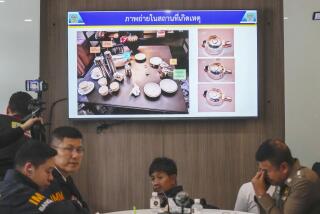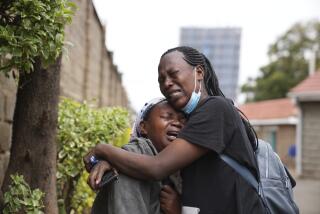A Dance of Death for Kenyan Troupe
MSUMARINI, Kenya — The blast that destroyed the Paradise hotel here may have been aimed at Israeli tourists, but it shattered the lives and livelihood of thousands of Kenyan villagers who relied on meager wages and tips for their survival. Among the hardest hit were survivors of the five dancers of the Giriama Dance troupe.
Before he left his hut about 3:30 a.m. Thursday to welcome Israeli vacationers, the troupe’s leader, 55-year-old Safari Yaa, kissed his wife goodbye and told her that when he returned, he would have enough money to buy food for their nine children. Yaa never made it back. Three suicide bombers slammed their explosives-laden sport utility vehicle into the hotel’s reception area, where the Giriama dancers were performing for arriving guests.
The entire troupe, including Yaa and his older brother Charo, was wiped out.
“He was the man we depended on,” said Yaa’s wife, Aisha, who is eight months pregnant. “We don’t know what we’re going to do without him.”
It was the second time this East African nation had paid a price in the war between terrorists and the West. The 1998 bombing of the U.S. Embassy in the capital, Nairobi, killed more than 200 Kenyans. Many among the 5,000 wounded lost limbs, their hearing or their eyesight.
There appears to be a consensus that the latest suicide attack will take a toll on Kenya’s floundering economy, which relies heavily on tourists coming to enjoy the warm beaches and game reserves. Tourism makes up 19% of the nation’s gross domestic product and is the second-largest earner of foreign currency after tea.
People say it is difficult to imagine a village that would be more affected than Msumarini.
On Friday, villagers began to deal with their losses. Graves were being dug in anticipation that authorities would release the bodies of the dancers. Every few minutes, the shrill, eerie wails of mourning women pierced the village, a sprawling collection of tiny mud huts surrounded by stout baobabs and swaying coconut palms.
At the Mramba household, about 20 women sat under a mango tree comforting Kadzo Masha, whose daughter died in the blast. Kafedha Mramba, a 36-year-old widow, had taken care of her three children with the tips she earned dancing for Israeli tourists at the Paradise hotel.
Dancing was Mramba’s hobby, according to her father, Mweni Mramba. Two years ago, after the unexpected death of her husband, she jumped at the opportunity to join the troupe.
“My daughter, my daughter, what are your children going to do now?” Elizabeth Hussein, the dead woman’s aunt, wailed in her native Giriama language. “Why did you go there?”
For many Msumarini residents, the Israeli-owned Paradise hotel was their only employment option. Most residents here live off the land, harvesting small crops of maize, potatoes, beans and coconuts. The hotel and its guests represented the main source of cash needed to buy oil and other staples.
Several hotel employees reported that they hadn’t been paid in months. The manager told them that their salaries from Israel were delayed. A few months ago, management paid part of their wages with small transistor radios and bedsheets, telling them the remainder would follow soon. It never did.
Yaa and his dancers did not receive a weekly wage but depended solely on the goodwill of guests.
Every Thursday, when a charter of about 250 tourists descended on the resort, members of the troupe would be waiting in the reception area to greet them.
Safari and Charo Yaa pounded out robust African rhythms on their homemade drums while Mramba and two other female dancers swayed and jiggled. The dancers would leave the hotel with about $25 dollars in tips, which they divided among themselves, according to Aisha Yaa.
She said Thursday that her husband told her he would use his portion of the tips to buy maize meal, tea and bread.
“How are we going to eat? I don’t know,” Aisha said. “My oldest is 18 years old, and he doesn’t have a job. We have nothing.”
The next moment, Aisha was wondering who would dig a grave for Safari. The children were too young for that. Maybe, she said to some neighbors who had come to her house to comfort her, other villagers might be willing to help.
Everyone agreed that Msumarini -- a tiny village on the Indian Ocean -- was an unlikely place for a terror attack.
Some residents -- those who could afford a battery-powered radio -- said they had heard about the Sept. 11 attacks in the U.S. but didn’t believe terrorists would come to their village.
“We don’t have a problem with them,” said a bewildered Dreesen Maye. “Why are they doing this to us?”
Robert Chingere, a 19-year-old bead craftsman, fretted that his livelihood went up with the flames that destroyed the hotel. Now there was no one who would buy key chains, necklaces and wrist bands.
“This is the biggest loss,” he said. “It’s going to take a little while for people to realize that Paradise is no longer there.”
As he spoke, villagers were digging Mramba’s grave. Evening was approaching, and the five bodies would arrive any minute.
More to Read
Sign up for Essential California
The most important California stories and recommendations in your inbox every morning.
You may occasionally receive promotional content from the Los Angeles Times.










